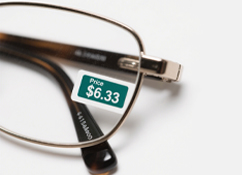Is your child’s glasses always sliding to one side, no matter how many times you adjust them? You’re not alone—we hear this question every day from worried parents at our clinic, especially during summer vision screening season. Custom-fit glasses for kids should stay straight—but why do they end up lopsided, and what can you do about it?
Glasses rely on 5 key parts to sit straight:
- Frames: Hold the lenses in place.
- Nose pads: Rest on the nose to keep glasses from slipping.
- Temples: The “arms” that hook over ears (the most common source of slanting!).
- Hinges: Let temples fold—loose hinges cause misalignment.
- Bridge: Connects both frames—too wide/narrow, and glasses slide.
If any of these parts are off, your kid’s glasses will slant.
Let’s break down the real causes—so you can fix the problem for good:
Most kids yank their glasses off with one hand (grabbing one temple and pulling). Over time, this uneven pressure bends the temples—permanently warping the frame. Even 3 - 4 times a day adds up!
Fix: Remind your kid to use two hands (one on each temple) to take glasses on/off. This simple habit prevents 60% of frame distortion.
80% of kids have slightly uneven ear heights or face shape—totally normal! But online glasses (which skip in - person fitting) can’t account for this. In - person optometry clinics measure your kid’s unique features: ear height, nose bridge width, cheekbone shape—and adjust frames to fit perfectly.
Risk of Online Glasses: You’re guessing size, which leads to slanting, discomfort, or even blurred vision. Save time (and money on returns!)—go in - person.
Glasses get tossed in backpacks, wiped on shirts, and worn daily. Over time:
- Screws loosen (hinges or temples come apart).
- Nose pads get greasy (slip off the nose).
- Hinges stiffen (temples don’t fold evenly).
Fix: Don’t DIY! A pro can tighten screws, clean nose pads, or adjust hinges in 10 minutes. Bending frames yourself will make slanting worse.
Soft, flimsy frames (like cheap plastic) can’t handle “unequal lens thickness” (when one eye has a stronger prescription than the other). The thicker lens pushes against the frame, warping it over time.
Fix: For kids with strong prescriptions, choose sturdy frames (TR90, metal, or acetate)—they hold shape better and resist warping.
Lopsided glasses don’t just look bad—they harm your child’s vision:
- Reduced Corrective Power: The lens center (where vision is clearest) moves away from the pupil. Your kid’s eyes won’t get the full benefit of their prescription.
- Distorted Vision: Slanted lenses make objects look tilted or blurry—causing dizziness, nausea, or double vision.
- Long - Term Eye Strain: Your kid’s eyes will overwork to compensate, leading to headaches, tired eyes, or even worsened vision.
Rule of Thumb: If you notice slanting at all, take the glasses to a professional vision center within 48 hours. If the frame is too bent to fix—get a new one (in - person fitted!).
- Choose sturdy frames (avoid cheap plastic for strong prescriptions).
- Remind your kid to use two hands for on/off.
- Get glasses adjusted every 3 months (even if they look straight!).
Worried about your kid’s slanted glasses? Our optometrists are here to help—call our free eye care hotline: (0833) 566 - 1373. We’ll answer your questions and schedule a fitting (or adjustment) in minutes.
Your child’s vision is too important to ignore slanting—act today!











